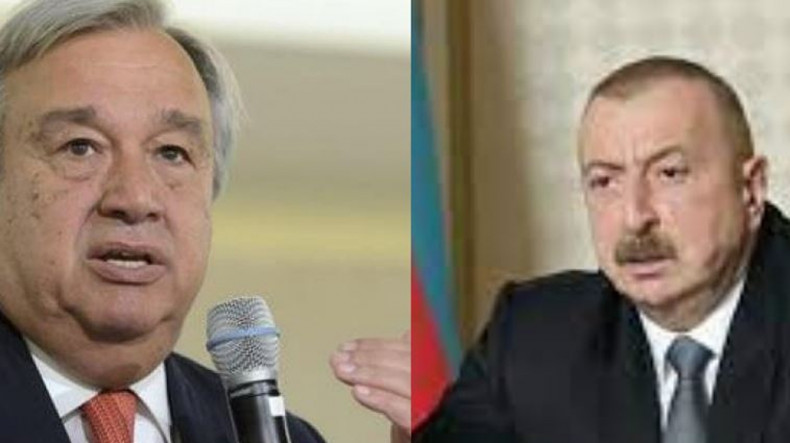
Text of UN-Azerbaijan agreement revealed for the climate summit to be held in Baku
By Harut Sassounian
As the UN Climate Summit (COP29) is set to be held in Baku starting on November 11, it is becoming increasingly clear that Azerbaijan should not have been allowed to host such a prestigious gathering. In addition to Armenian protests about ethnic cleansing and the illegal detention of Armenian prisoners in Baku, there have been worldwide objections about the Conference being held in Baku because of Azerbaijan’s flagrant and persistent violations of human rights.
On October 10, Human Rights Watch (HRW) published an article titled, “COP29 Host Country Agreement Lacks Rights Protections: Azerbaijan Should Guarantee Rights of Civil Society Participants at Climate Conference.” HRW expressed its serious concerns about Baku hosting the Conference.
HRW obtained a copy of the signed UN-Azerbaijan Agreement which has not been made public, despite the fact that UN members had insisted “that host country agreements should be made publicly available and should uphold international human rights law.”
HRW urged the UN to “publicly call upon the Azerbaijani government to respect its human rights obligations and facilitate a rights-respecting climate conference.” Amnesty International also issued a similar request in July. It is important that the Agreement protect not only the rights of Azerbaijani citizens, but also the safety and security of thousands of international participants of the Conference.
When I clicked on the link that HRW had included in its article, I found the text of the 20-page-long Agreement signed between the UN and the Government of Azerbaijan in August 2024. HRW complained that the Agreement “is replete with significant shortcomings and ambiguities on the protections for participants’ rights.” For example, while the Agreement states that Conference participants “shall enjoy immunity from legal process in respect of words spoken or written and any act performed by them,” it requires that they “respect Azerbaijani laws and not interfere in its ‘internal affairs.’”
Here are the highlights of the signed Agreement:
--“The Government [of Azerbaijan] is committed to uphold the fundamental human rights, dignity and worth of the human person, and equal rights of all participants participating in the Pre-sessional Meetings/Conference/UNFCC Meetings [United Nations Framework Convention on Climate Change].”
--“The area within the Baku Olympic Stadium where the Conference and the Pre-sessional Meetings shall be held, including any area immediately outside it, will be under the direct supervision and control of the United Nations Department of Safety and Security….”
--“Host country support and technical personnel shall be guided by the highest ethical and professional standards and are expected to behave with integrity and respect. The Government shall ensure that relevant standards are fully understood.”
--“The Government shall be responsible, at its expense, for such police protection and security as may be required to ensure the efficient running…of the Conference without interference of any kind.”
--“Security within the Conference premises shall be the responsibility of the UN Department of Safety and Security…. Security outside the Conference premises shall be the responsibility of the Government…. Such security personnel shall be guided by the highest ethical and professional standards and are expected to behave with integrity and respect. The Government shall ensure that relevant standards are fully understood.”
--All Participants “shall enjoy the privileges and immunities within the Republic of Azerbaijan,” under the UN “Convention on the Privileges and Immunities…. The representatives of observer organizations/other persons…shall enjoy immunity from legal process in respect of words spoken or written and any act performed by them in connection with their participation” in the Conference.
--All Participants “have the right of entry into and exit from the Republic of Azerbaijan and no impediments shall be imposed on their transit to and from the Conference premises.” Exceptions can be made in case the Government presents to the UN “well founded objections based on law concerning the entry of a particular individual. Such objections must relate to specific criminal, security matters and not to nationality, religion, professional or political affiliation.”
--The Conference premises are “protected…and access thereto is subject to the authority and control of the [UN] secretariat. These premises shall be inviolable for the duration of the Conference.”
--All Participants enjoying “privileges and immunities provided by this Agreement…have the duty to respect the laws and regulations in force in the Republic of Azerbaijan and have the duty not to interfere in its internal affairs.”
--In addition to paying the expenses of hosting the Conference, the Government of Azerbaijan will reimburse the UN $5,811,800 for the costs incurred in planning the Conference, airfare for UN personnel, and technical services.
The Agreement finally states that “upon the conclusion of the Conference, the [UN] secretariat will issue a report regarding the implementation of the terms of this Agreement, including on lessons learned and challenges faced, to the [UN] Bureau.”
We will find out at the end of the Conference if Azerbaijan has abided by the terms of the Agreement, particularly in respect to human rights, including suppression by police of public protests by Azerbaijani citizens during the Conference.